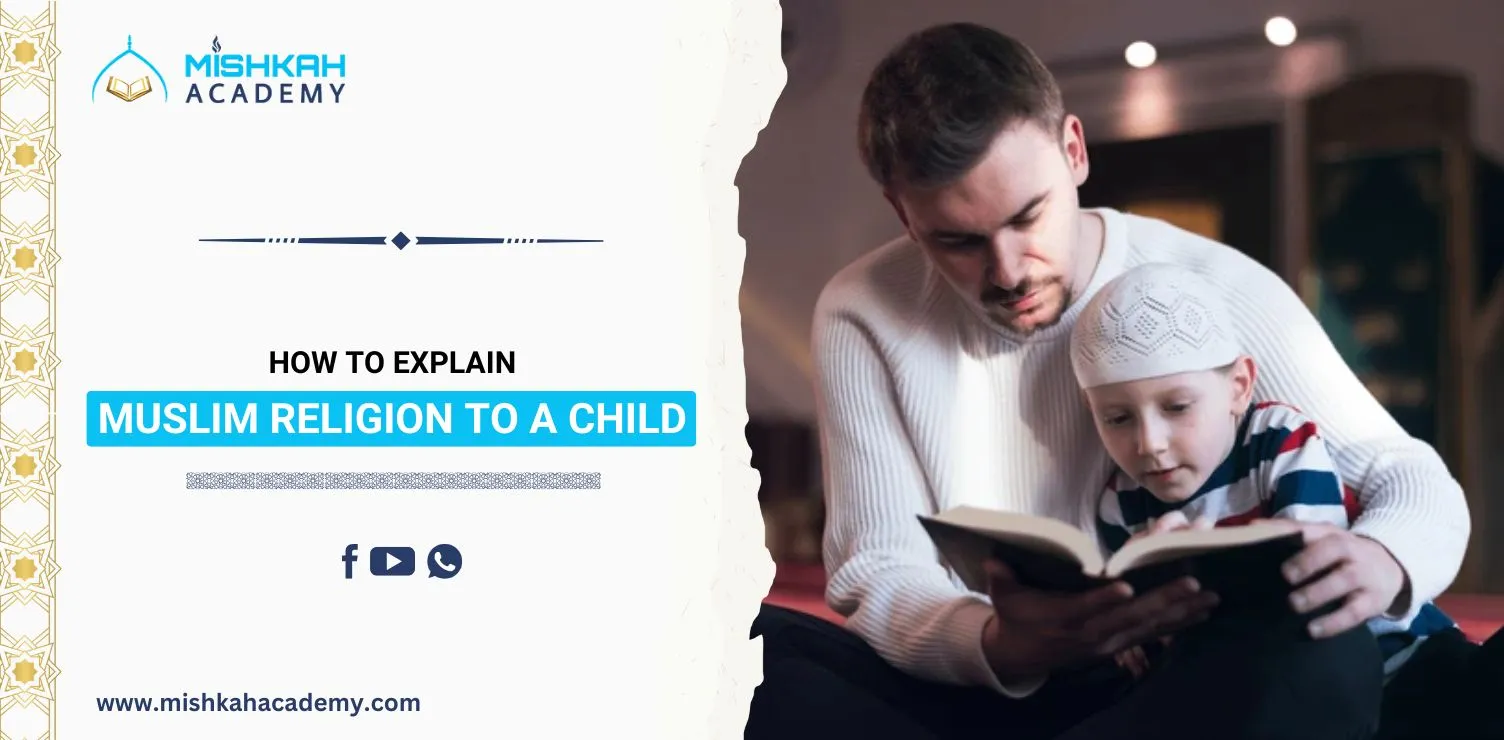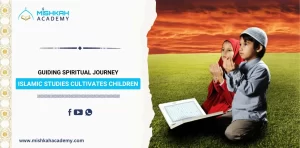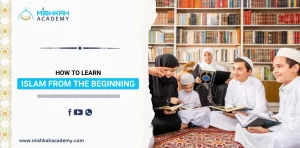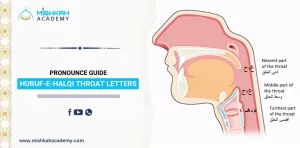Explaining Islam to children is a big responsibility for parents. It can be challenging to make them understand faith at a young age. However, you can start by telling them that Muslims worship one God, Allah. Their holy book is the Quran, and Muhammad (PBUH) is Allah’s last Messenger. These simple facts give children a basic idea of their faith.
Then, parents can add more details, like the concept of oneness and the 5 pillars of Islam. Talking about these beliefs helps children understand why Muslims live and worship differently. With gentle guidance and clear words, and by enrolling them in Islamic studies for kids classes, parents can introduce Islam in a way that builds respect and faith from an early age.
What Does “Islam” Mean?
Table of Contents
Toggle“Islam” is an Arabic word that means “submission” and “peace.” In Islam, this means surrendering to the will of Allah, the Creator of everything. The word itself comes from the Arabic root “S-L-M,” which carries meanings of peace and harmony.
Islam teaches that true peace is found in accepting Allah’s guidance and following His commands. This way, believers can live with inner peace and a sense of purpose. Explaining Islam as a way of living in peace with Allah and His creation can help children understand that Islam is more than a religion—it’s a complete way of life focused on love, respect, and kindness.
What is the Short Definition of “Muslim”?
A “Muslim” is a person who follows Islam, believing in one God, Allah, and His teachings. The word “Muslim” means “one who submits,” showing complete trust in Allah and a desire to live according to His guidance.
Muslims follow the teachings of the Quran, the holy book revealed to Prophet Muhammad (PBUH), the last Messenger of Allah. Muslims try to live with kindness, honesty, and respect for others. They believe their purpose is to worship Allah and to help others.
Start Your Islam Learning Journey NowTeaching the Concept of Tawheed (Oneness)
Tawheed, the concept of oneness, is central to Islam. It means believing in only one God, Allah, without any partner. This belief is beautifully summarized in Surah Al-Ikhlaas (112:1-4) from the Quran:
قُلْ هُوَ ٱللَّهُ أَحَدٌ
ٱللَّهُ ٱلصَّمَدُ
لَمْ يَلِدْ وَلَمْ يُولَدْ
وَلَمْ يَكُن لَّهُۥ كُفُوًا أَحَدٌ
Each part of this Surah has deep meaning:
- “قُلْ هُوَ ٱللَّهُ أَحَدٌ” – Say, He is Allah, the One. This verse declares Allah’s oneness, showing there is no other like Him.
- “ٱللَّهُ ٱلصَّمَدُ” – Allah is Eternal. He depends on no one, while all need Him.
- “لَمْ يَلِدْ وَلَمْ يُولَدْ” – He neither gives birth nor was He born, emphasizing His uniqueness.
- “وَلَمْ يَكُن لَّهُۥ كُفُوًا أَحَدٌ” – No one is equal to Him. This assures us Allah has no partners.
Teaching children Tawheed through Surah Al-Ikhlaas helps them understand that Allah is unique and deserves all worship and love.
Prophet Muhammad (PBUH) and His Role in Completing Islam Religion
Prophet Muhammad (PBUH) is the final Messenger of Allah, sent to guide humanity. His name is mentioned in the first Kalima (Shahada), which declares faith: لَا إِلٰهَ إِلَّا ٱللَّهُ، مُحَمَّدٌ رَّسُولُ ٱللَّٰهِ (There is no god but Allah, Muhammad is the Messenger of Allah). This emphasizes his role in delivering Allah’s message to all people.
The Prophet (PBUH) received revelations of the Quran over 23 years. Each verse was revealed to guide Muslims in life and faith. Prophet Muhammad (PBUH) carefully taught and explained the verses to his followers. He ensured they memorized the words and understood their meaning, preserving the Quran exactly as it was revealed. His dedication in spreading and explaining Allah’s words completed Islam as a perfect way of life for all humanity.
Five Pillars of the Muslim Religion
| Pillar | Explanation for Children |
| Shahada (Faith) | Believing in one God, Allah, and that Muhammad (PBUH) is His Messenger. This makes us Muslim and reminds us that we live with Allah’s love and guidance. |
| Salah (Prayer) | Muslims pray five times daily. These prayers are special times to talk to Allah, ask for help, and show thankfulness. |
| Zakat (Charity) | Giving a small part of our money to help those who have less. It teaches kindness and sharing with those in need. |
| Sawm (Fasting) | Fasting during Ramadan means no eating or drinking from sunrise to sunset. It helps us feel grateful for what we have. |
| Hajj (Pilgrimage) | Muslims try to visit Makkah at least once in their lives. This journey teaches us about equality, unity, and our love for Allah. |
Explaining The Concept of Jannah and Hellfire
Explaining Jannah (Paradise) and Hellfire to children helps them understand the importance of doing good and following Allah’s guidance. Jannah is a beautiful, joyful place that Allah has created for those who do good deeds and believe in Him. Allah says in the Quran,
“And those who believe and do good will be the residents of Paradise. They will be there forever.” (Quran 2:82).
Hellfire is a place for those who knowingly do wrong and disobey Allah. The Prophet Muhammad (PBUH) said,
“When Allah created Paradise and Hellfire, He sent Gabriel to Paradise, saying: ‘Look at it and at what I have prepared therein for its inhabitants'” (Sahih Muslim 2843).
Parents can explain that Allah is fair, and He rewards good deeds and warns against bad ones, helping us choose the right path.
Introducing Jinn and Shayateen Gently to Children
Introducing the concept of jinn and shayateen (evil ones among the jinn) to children can be done gently, ensuring they feel safe and informed. Jinn are creations of Allah, like humans, with free will. Some jinn are good and obedient to Allah, while others choose to do wrong and become shayateen. Allah mentions in the Quran, “And I did not create the jinn and mankind except to worship Me” (Quran 51:56), explaining that their purpose is similar to ours.
The Prophet Muhammad (PBUH) also taught us ways to seek Allah’s protection from shayateen, saying,
“When evening comes, keep your children indoors, for the devils come out at that time” (Sahih Bukhari 3280).
Parents can gently explain that while jinn exists, Allah protects us, and reciting short prayers keeps us safe from harm.
Conclusion
Parents can simplify their journey of teaching Islam to their children with the help of Mishkah Academy by enrolling in online Islamic classes. With experienced quran tutors who have spent years guiding young minds, they provide valuable lessons on faith, values, and essential concepts quran in our online Quran classes for kids.
This support allows parents to feel confident in answering their children’s questions about Islam, ensuring they grow with a strong foundation. Together, they can nurture a love for learning and strengthen their connection to their faith.
Start Your Islam Learning Journey Now





